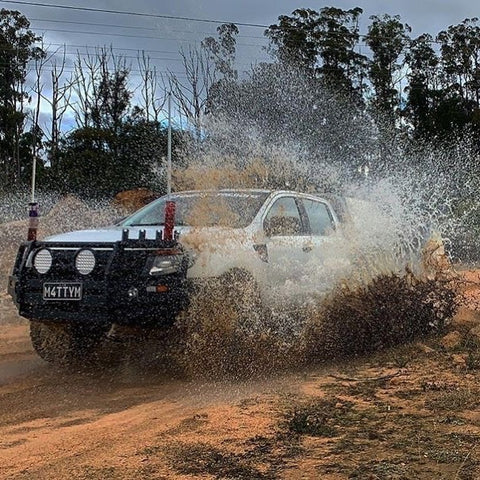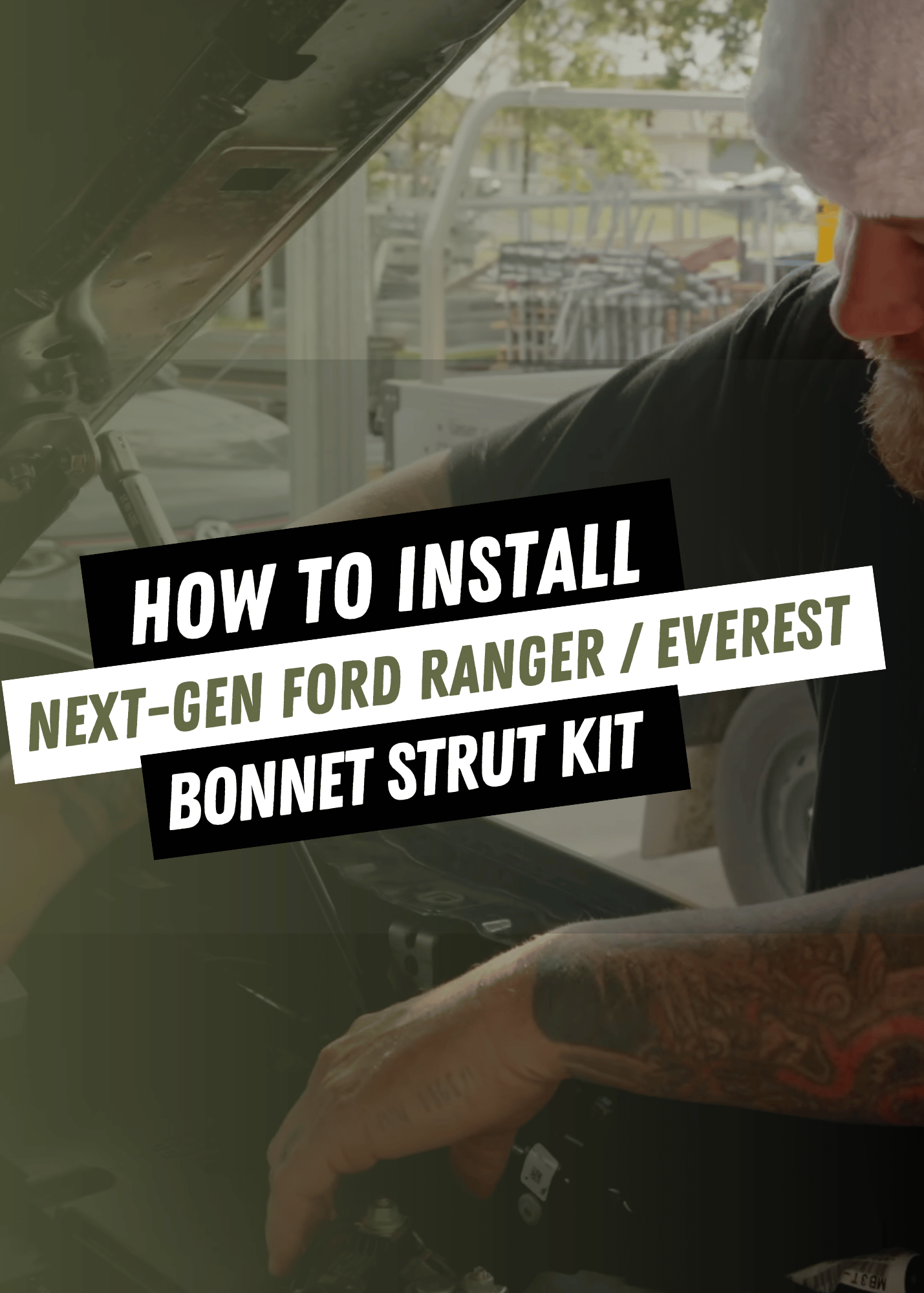
Offroading Gear and Crossing Rivers
Crossing rivers while offroading in Australia can be hazardous and should be approached with caution. However, crossing them is all a part of getting out there in your 4x4, and as long as you understand some tips, you can do it safely and without damaging your vehicle.
This post walks you through river crossings while offroading so that you, your vehicle, and your offroading gear stay safe and intact.

Best Practices for Crossing a River in Your 4x4
It's crucial to evaluate the conditions and take necessary precautions to ensure a safe river crossing. Here are some tips for crossing rivers when offroading:
- Assess the river. Before attempting to cross, evaluate the depth, flow, and conditions of the river. Look for hazards such as rocks, logs, or submerged obstacles.
- Check the crossing point. If possible, find a shallow and wide section of the river with a steady current. Avoid areas with deep holes or swift currents.
- Find your exit point. Identify the exit point before starting the crossing. Ensure there's a safe place to exit the river on the other side.
- Walk the crossing. Before driving through, walk across the river to get a better sense of the conditions, water depth, and bottom surface. Look for potential hazards that may not be visible from the vehicle.
- Engage 4WD and low range. Engage four-wheel drive (4WD) and low range to improve traction and control while crossing.
- Deflate your tires. Reduce tire pressure to improve tire floatation and grip on the riverbed. Lower tire pressure helps the tires conform to the riverbed and reduces the risk of getting stuck.
- Maintain a steady pace. Drive slowly and maintain a steady pace without accelerating or braking too much. Avoid sudden maneuvers that can disturb the water flow.
- Stay in the middle. Attempt to cross in the middle of the river, where the water is typically shallower. Avoid hugging the banks where the water may be deeper.
- Create a bow wave. If the river has a strong current, drive at an angle slightly upstream to create a bow wave in front of the vehicle. This helps push the water away from the vehicle's engine and air intake.
- Watch for deep water. If the water level rises and reaches the vehicle's hood or engine intake, stop immediately. Water entering the engine can cause serious damage.
- Have an escape plan. If the crossing becomes unsafe or the water level rises unexpectedly, have an escape plan to retreat to higher ground.
- Watch for wildlife. Be aware of the potential presence of wildlife, especially crocodiles, in some parts of Australia. Never approach or disturb wildlife in or near the water.
- Keep revs steady. Maintain a constant engine speed without excessive revving. Keeping a steady pace reduces the chances of stalling the vehicle.
- Dry your brakes. After crossing the river, lightly tap the brakes to dry them and restore braking effectiveness.
Before you undertake offroading, let alone crossing a river in your 4x4, make sure you outfit your vehicle with the proper offroading gear to ensure a safe crossing for your vehicle.
If you are unsure about the river crossing or feel uncomfortable with the conditions, consider seeking an alternative route or waiting for the water level to recede. River crossings can be dangerous, and safety should always be the top priority when offroading. When in doubt, seek advice from experienced offroaders or locals familiar with the area.

Safety Tips for Offroading
Offroading can be an exciting and adventurous activity, but it also comes with inherent risks, especially when exploring remote and rugged terrains. To ensure your safety and the safety of others during offroading adventures, it's crucial to take specific safety measures.
Here are some essential safety tips for offroading:
- Plan your trip. Before heading out, research and plan your offroading route. Know the terrain, weather conditions, and potential hazards you might encounter along the way.
- Inform others. Let someone know your offroading plans, including your intended route, expected return time, and emergency contact information.
- Travel in a group. Offroad with other vehicles whenever possible. Traveling in a group increases safety in case of emergencies, vehicle breakdowns, or getting stuck.
- Carry essential gear. Pack necessary safety and recovery equipment, including a first aid kit, fire extinguisher, recovery straps, shackles, winch, shovel, and tire repair kit.
- Know your vehicle. Be familiar with your 4x4's capabilities and limitations. Understand how to engage four-wheel drive, diff locks, and other offroad features.
- Check your vehicle’s condition and offroading gear. Perform a thorough vehicle and equipment check before the trip. Ensure that your vehicle is in good working condition, with all fluids topped up, brakes working correctly, and tires in good shape.
- Use proper tire pressure. Adjust tire pressure according to the terrain. Lower pressure for soft surfaces like sand or mud and reinflate when back on firm ground.
- Stay on designated tracks. Stick to designated offroad tracks and trails. Offroading in sensitive or protected areas can cause environmental damage.
- Respect wildlife. Observe animals from a distance and avoid feeding them. Remember, you are a guest in their habitat.
- Be prepared for emergencies. Carry ample water, extra food, and warm clothing. Be prepared for unexpected weather changes or getting stranded.
- Be cautious with water crossing. Approach water crossings with care and test the depth before proceeding. Never cross fast-flowing or deep water without proper preparation.
- Monitor weather conditions. Check the weather forecast before starting your offroading journey. Avoid offroading in severe weather conditions.
- Use communication devices. Carry a UHF radio or satellite phone for communication, especially in areas without mobile phone coverage.
- Recover vehicles with safety in mind. When recovering stuck vehicles, ensure everyone stands clear of the recovery operation to avoid accidents.
- Be environmentally responsible. Leave no trace of your visit. Take all rubbish with you and avoid disturbing natural habitats.
- Know emergency procedures. Familiarize yourself with emergency procedures, including how to call for help and administer first aid. Make sure everyone in your group knows how to use your radio and offer basic first aid.
Offroading has its risks, but it pays off in huge rewards. If you want to go offroading in your 4x4, you’ll never regret it as long as you prepare ahead of time and understand how to navigate the varied terrain, such as river crossings, properly and safely. To ensure your time off-road is a fun-filled adventure, make sure you equip your vehicle with the offroading gear you need. You can find a wide range of supplies at Pirate Camp Co., and they’ll help you figure out what you need so you can be well on your way to adventure.













